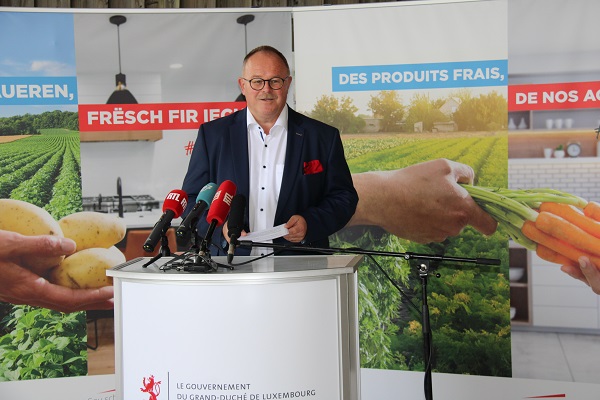 Romain Schneider, Luxembourg's Minister of Agriculture, Viticulture and Rural Development;
Credit: MA
Romain Schneider, Luxembourg's Minister of Agriculture, Viticulture and Rural Development;
Credit: MA
Luxembourg's Minister of Agriculture, Viticulture and Rural Development, Romain Schneider, presented today a recovery plan for the agricultural sector with a total budget of €5 million.
The stimulus plan provides for targeted measures to counter the cash flow problems of certain agricultural activities resulting in particular from the impossibility of welcoming the public. In addition to consolidation, a second elementary component of this revival will be the promotion of local production.
Although the essential activity of the agricultural sector was not interrupted during the health crisis in order to ensure the supply chain, the sector was not spared and had to cope with the losses caused by the closure of restaurants and collective catering.
In this context, Minister Romain Schneider thanked the entire sector for its exemplary commitment and for having managed to guarantee the continuity of the food production and supply process. He commented: "The pandemic will have had a positive effect: that of raising awareness of the work of farmers in the food chain, of the true qualitative value of their products, and of the dangers of too much food dependence on the stranger".
It is for this reason that the recovery plan provides for a substantial budget for the diversification and promotion of short circuits and quality local agricultural products. Minister Romain Schneider added: "Favouring national production means participating in the surge of solidarity towards the agricultural sector".
The third component of the recovery plan aims to support innovation to enable the sector to face food, environmental and climate challenges with the appropriate means and technologies.
In addition to this package of measures, Luxembourg's Agriculture Minister presented the adaptations of the agrarian law adopted by the Government Cabinet on Friday 29 May 2020 and which are also partly in a context of recovery. Since the Common Agricultural Policy (CAP) 2020 negotiations have lagged behind at the European level, the new guidelines cannot be implemented as planned on 1 January 2021. However, it is considered essential to guarantee continuity and predictability in the management of agricultural exploitations.
The changes made, which represent additional financial support of €4.3 million, therefore avoid the legal vacuum, ensure the proper functioning of agricultural activity and include some innovative milestones: a focus on the qualitative rather than quantitative aspect when investing in aid; favouring innovative and ecological equipment; and promoting short circuits by subsidising solidarity farming.
For Minister Romain Schneider, it is essential to support these new forms of partnership between producer and consumer, which are part of the policy of promoting local, seasonal and organic products: “This type of partnership guarantees a stable annual income to the producer and provides the consumer with all the information on the production method of the food purchased. [...] The promotion of short circuits is an additional step towards diversification of Luxembourg agriculture”.
The recovery plan thus focusses on measures and initiatives to consolidate, promote and support innovation, as well as the adaptations made by the agrarian law, constitute a coherent whole aimed at allowing the sector to strengthen its position in the supply chain from farm to fork, while considerably increasing Luxembourg's food independence from abroad.
Minister Romain Schneider however made it clear in this context that the economic repercussions, both in the medium and long term, remain difficult to quantify at present. Thus, a detailed analysis of the agricultural sector and of structural changes over the year will be made to provide additional solutions, if necessary.
Finally, Agriculture Minister announced that, on the basis of this detailed analysis, agricultural meetings in the presence of the Minister of State (Prime Minister Xavier Bettel) will be organised in autumn to discuss specific problems, in particular the horticultural sector as well as analysing the future direction of the CAP after 2020.








